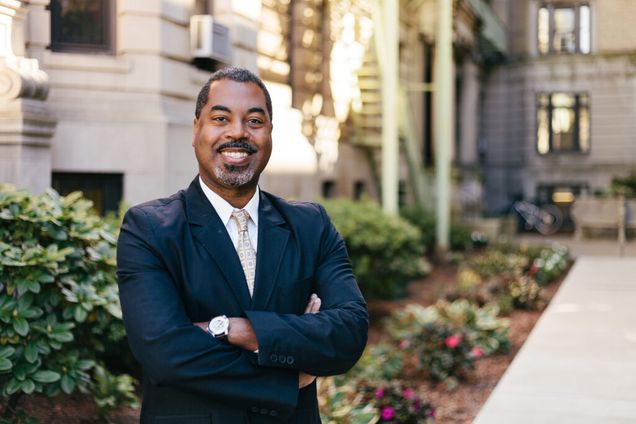June 2023: Dr. Phillipe Copeland (BU School of Social Work)
 Dr. Phillipe Copeland is a Clinical Associate Professor at the Boston University School of Social Work. He is a public scholar, educator, writer, speaker, trainer, facilitator, consultant and digital activist. Dr. Copeland’s personal mission is a world without racism. Two fundamental questions animate his efforts:
Dr. Phillipe Copeland is a Clinical Associate Professor at the Boston University School of Social Work. He is a public scholar, educator, writer, speaker, trainer, facilitator, consultant and digital activist. Dr. Copeland’s personal mission is a world without racism. Two fundamental questions animate his efforts:
- What do people need to learn in order to solve the problem of racism?
- What are the best ways to help people learn these things?
Dr. Copeland’s interdisciplinary approach to these questions spans a number of subjects including abolition, decarceration, health justice, racial trauma, racism denial, and antiracism through culture and narratives.
Dr. Copeland has served as co-leader of the Promote Smart Decarceration (PSD) Grand Challenge as part of the Grand Challenges for Social Work, an initiative of the American Academy of Social Work and Social Welfare and a founding member of the first-ever Racial Justice Council of the Massachusetts Chapter of the National Association of Social Workers (NASW-MA). In addition, he has served as an advisory committee member for the Racial Reconciliation and Healing Project at Southern Jamaica Plain Health Center and a community advisory board member of the Master in Public Health Program at Simmons University. Dr. Copeland has as the Faculty Lead for Education and Training at the BU Center Antiracist Research where he developed and co-led the Designing Antiracist Curricula (DAC) Fellowship. His digital activism includes participating in movements against conservative efforts to mandate miseducation, K-college such as #TeachTruth and against book bans such as #UnitedAgainstBookBans. Learn more about Professor Copeland in his full interview below.
What made you decide to be a social scientist/ why does social science matter to you?
Social work involves a unique combination of social service, social change, and social science. Becoming a social scientist was a way of fully embodying all of these elements of social work. Social science matters to me because of the power it has to inform efforts to ensure a free and living planet for everything on it. This includes achieving a world without racism. I want our species to succeed. Racism is in our way. Either we end racism, or racism will end us.
I am particularly interested in the contributions social science can make to refining the art and science of antiracist education. We must ensure that every learner is fully prepared and equipped to be part of the solution to racism.
Can you tell us about a recent research project that you’re excited about?
A recent research project that I am excited about is entitled “Creation and validation of the anti-racism efficacy measure: factor analysis and measurement invariance.” The authors included Dr. Rob Eschmann, Columbia University, Julian G. Thompson, University of Illinois at Chicago, Allen G. Harbaugh, Longwood University and myself. This study was recently published in the journal Social Science and develops and validates the Anti-Racism Efficacy Scale (A-RES), a 4-item measure that examines (1) competence, or self-rated ability to challenge racism and (2) impact, the degree to which an individual believes they may create change in working against racism. Drawing on a sample of 1322 college students, including 26.6% White, 20.6% Black, 17.1% Latinx, 25.3% Asian or Pacific Islander, 1.2% American Indian, and 9.3% indicating either nothing, other or more than one racial grouping, we test for measurement invariance, conduct a factor analysis, and use ANOVA to compare factor scores by racial grouping. Past literature on antiracism has either not focused explicitly on efficacy, or has not developed means to measure it. The A-RES scale assesses the extent to which individuals feel they are capable of exerting some impact on racism in society. I am particularly excited about the implications of this scale for antiracist education. The A-RES could be used as a means of assessing antiracism as a learning outcome and help with identifying teaching methods that increase anti-racism efficacy.
What is the best piece of professional advice you ever received?
I would say that the best professional advice I have ever received was being intentional about making career decisions based upon what is best for my family. I practice that as faithfully as possible. I like to say that I am a full time partner and parent and a part-time everything else.
What is your favorite course you’ve taught at BU?
My favorite course I have taught at BU is a course I developed about the Black Lives Matter (BLM) movement. The course focuses on the origins, ideologies, values, and methods of BLM and its implications for antiracist practice from the arts and culture to public policy.
Tell us a surprising fact about yourself.
I am an avid student of Muay Thai, a traditional form of Thai kickboxing.